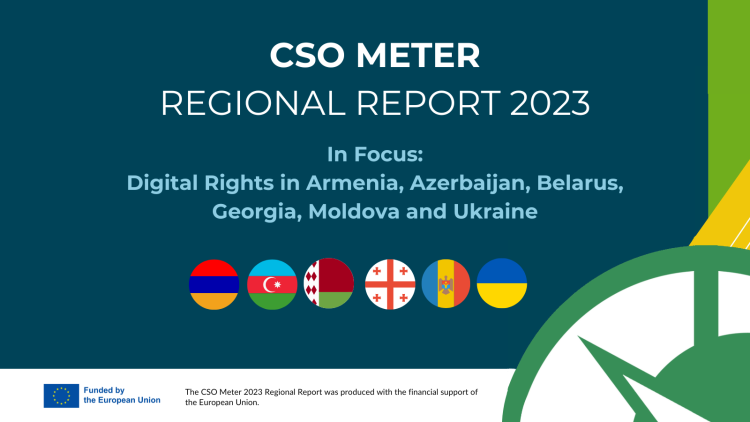
Civil society in the Eastern Partnership countries has admirably navigated and persevered in 2023, which has been another tumultuous year with growing complexities and challenges, including:
- An increasing number of initiatives regulating lobbying and foreign funding;
- Revised FATF standards to rectify unintended consequences from the misapplication of anti-money laundering and counter-terrorism financing (AML/CTF) measures;
- Increased regulation of artificial intelligence (AI) and online platforms and the global expansion of surveillance.
We have seen a persistent lack of improvement in the civil society environment and, some areas, for instance in Freedom of Expression and State Duty to Protect, have even deteriorated.
Key priorities
To guide states, European Union (EU) institutions and donors when assessing EaP countries' progress towards EU integration, preparing rule of law reports, or shaping funding and political priorities, the CSO Meter 2023 Regional Report formulates some key recommendations:
- There is a need for states to take progressive measures to ensure enjoyment of basic civic freedoms for individuals and groups. This means the lifting of restrictions imposed on freedom of association and access to funding in Belarus and Azerbaijan, and ensuring freedom of peaceful assembly and expression across the region.
- The state authorities in Azerbaijan, but also in Belarus, should cease all forms of repression against civil society, release political prisoners and terminate all politically-motivated criminal cases and investigations against CSO activists, journalists, bloggers, and human rights defenders. There is still an urgent need to stop the forced liquidation of CSOs in Belarus.
- The European Council's decision in December 2023 to initiate accession negotiations with Ukraine and Moldova and grant Georgia candidate country status represents a significant historical milestone. It is important to ensure and support the pivotal role of civil society in the EU integration process.
- States should support the right to participation in the decision-making process and adopt legislation and mechanisms for effective public participation, building on the positive examples seen in Moldova and Armenia. This also means that initiatives on regulating lobbying, such as the draft law on lobbying in Ukraine, do not infringe the legitimate right of civil society to engage in advocacy and in public life.
- States should support the financial sustainability of CSOs directly via diverse forms of state support as this is the area assessed as the lowest in the region. States have a positive obligation to adopt measures that support CSOs’ access to diverse domestic and foreign sources of funding. States also have an obligation to improve the measures that negatively influence CSOs’ sustainability, such as burdensome reporting requirements, misapplied AML/CTF measures, and adopting stigmatising and restrictive laws on ‘foreign agents’.
In Focus: Digital Rights
Digital rights continue to evolve in the region but political developments, in particular the Russian aggression in Ukraine and the conflict in Nagorno-Karabakh, put digital rights protections under constant pressure. In 2023, several EaP countries saw the expansion of surveillance powers of the state and the restriction of freedom of expression online, including attempts to silence activists and government critics. Disinformation remains a significant challenge in the region: CSOs in Georgia and Armenia noted disinformation attacks against civil society and at times, government responses to disinformation unduly restrict freedom of expression. There is significant progress in terms of developing comprehensive data protection legislation, notably in Moldova and Georgia, but countries are struggling with the implementation and enforcement of new rules. Digitalisation efforts continue in the region with several best practices emerging in terms of civil society participation in these processes.
